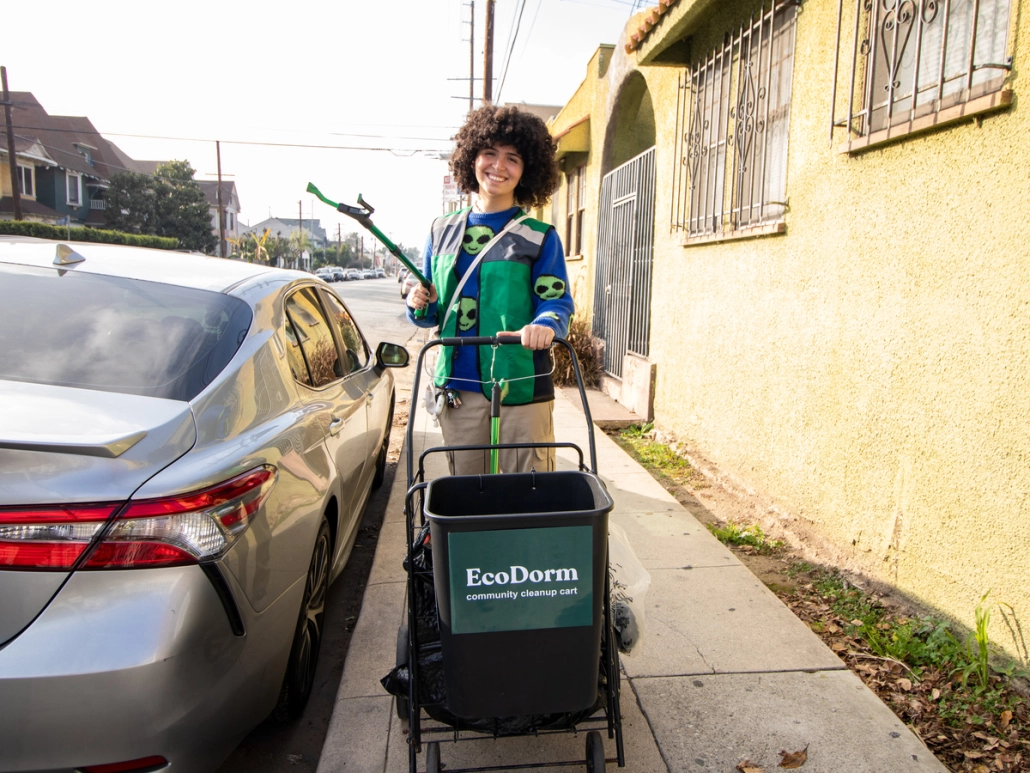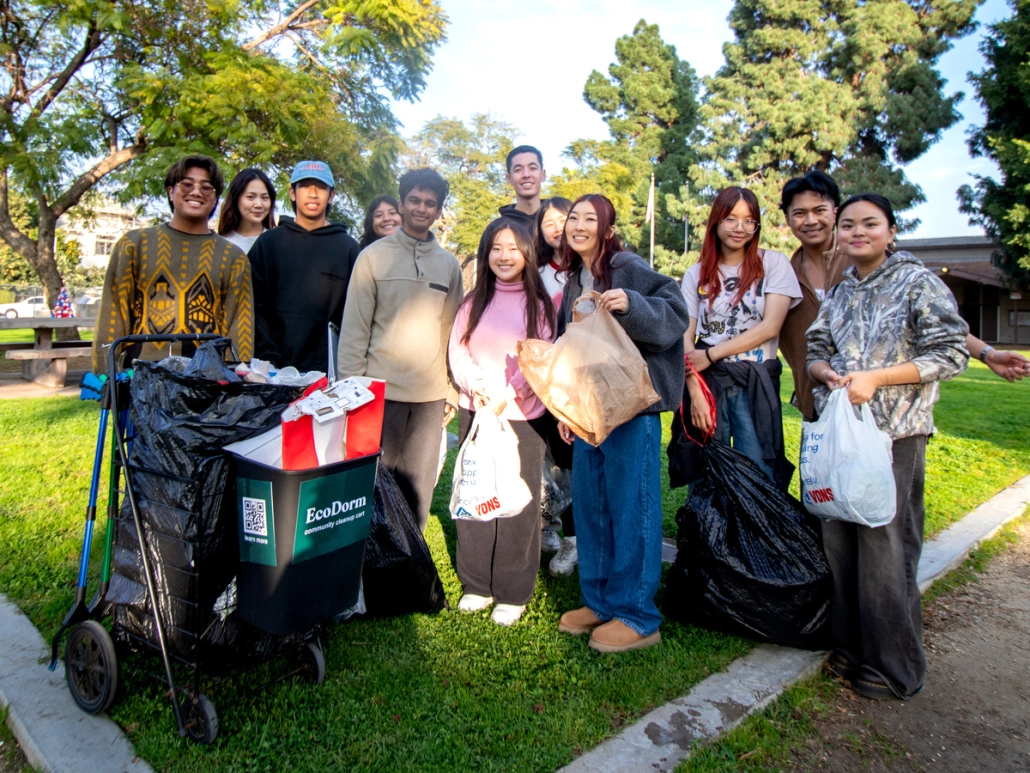EcoDorm cleans, furnishes sustainably
The climate justice-oriented organization revamps used dorm items to foster equity.
The climate justice-oriented organization revamps used dorm items to foster equity.

EcoDorm, founded by student JJ Flores, wants to bridge an affordability gap when it comes to college dorm furnishment.
From 2019 to 2023, the average amount each household spent on back-to-college dorm shopping increased by 40%, to about $1,367 per person, according to an annual survey by the National Retail Federation and market researcher Prosper Insights & Analytics. Unfortunately, this is not always an affordable option for many families.
Meanwhile, the average college student produces about 640 pounds of waste every year, as found by the Columbia University Greens, with significantly more waste during move-out season, resulting in mountains of still-functional debris such as rugs, fans and mattresses.
In Fall 2021, Flores, a junior majoring in international relations, founded EcoDorm, an organization dedicated to reducing the waste generated during move-out and aiding those who can’t afford dorm supplies. EcoDorm began operations in July 2023, starting in South Central.
EcoDorm’s fight for sustainability and affordability within the college sphere involves a two-pronged approach: zero-waste move-outs and community cleanups.
“Housing departments are paid, and universities are already paying for hauling all of the things that are put into dumpsters, and it’s coming at a huge cost to universities,” Flores said. “[Students are] paying for that cost in our tuition.”
During the move-out period, EcoDorm services housing departments by renting out donation bins and doing daily pickups. Over the summer, EcoDorm cleans and repairs any usable items with the help of community members and students, and then, during move-in season, EcoDorm gives about 20% of the refurbished items to community organizations in South Central that request them.
“After that, the goal is to host on-campus pop-up shops where students can either buy online or pick up in-store, or even before they move in, they can see the website and all the items that are on there [and] reserve it, or they can just show up after they move in and grab the items that they want,” Flores said.
With the profits from the pop-up shops, EcoDorm funds the only community cleanup in South Central, partnering with organizations such as the USC Student Sustainability Committee, the Environmental Student Assembly and, most recently, Alpha Phi Omega, a service organization. On Feb. 17, EcoDorm and APO were able to pick up 52.4 pounds of trash and recyclables around the Hoover Recreation Center in one hour.
Josh Placido, a freshman majoring in computational neuroscience and a new member of APO, said working with EcoDorm opened his eyes to the ability to make change in local communities.
“It can be quite a challenge to open or look more broadly and see the communities that are being impacted and the communities we’ve kind of forced ourselves in, especially since USC is more gentrified compared to the communities we’re serving through EcoDorm,” Placido said.

Even though EcoDorm is not a USC-affiliated organization, its recent cleanups have been with USC organizations, and Flores is looking to expand within Southern California and USC.
“The USC campus and students can feel very disconnected from reality, from its surrounding community. It can feel like a bubble sometimes,” Flores said. “It’s literally called University Park because [Google Maps shows] it’s the most green space in all of South [Central].”
Though USC has implemented sustainability initiatives involving less energy usage and emissions and water conservation, Flores believes that the University is falling behind, especially since many of its Assignment: Earth goals target zero waste.
President Carol Folt’s 2028 sustainability plan includes a zero-waste initiative and aims to divert 90% of waste from landfills to maximize value and best manage resources.
“[Reducing move-out waste] also solves circularity, so the University has a lot of reasons why they would want to partner with EcoDorm,” Flores said. “Students can email their housing departments saying that they really want zero-waste move-out programs, and maybe they can even tell them about EcoDorm.”
Although housing at USC is guaranteed to freshmen and sophomores, for upperclassmen, finding affordable housing in addition to reasonably priced dorm essentials can be difficult. Jantzen Ebreo, a sophomore majoring in health promotion and disease prevention studies who is also a new member of APO, said EcoDorm can provide some relief to those searching for furniture.
“I think that EcoDorm is doing a really good job at introducing a more eco-friendly way to refurbish these furnitures that college students are not using anymore and reselling it for much cheaper prices, especially targeted toward college students that need furniture, for example, moving in,” Ebreo said.
Along the same vein, it’s even more of a challenge for low-income individuals to shell out hundreds of dollars for new dorm essentials every year. Placido, who is a first-generation low-income student, commented on the equity that EcoDorm promotes between students of various socioeconomic backgrounds.
“I really empathize with the people who come from these underrepresented, less-privileged backgrounds and worrying about housing situations and affordability of that [rather than] actually receiving a quality education,” Placido said. “So I think EcoDorm’s initiative really bridges that gap.”
EcoDorm’s community cleanups, which are open to everyone, take place every Saturday from 3 p.m. to 4 p.m., and groups can sign up on EcoDorm’s website.
We are the only independent newspaper here at USC, run at every level by students. That means we aren’t tied down by any other interests but those of readers like you: the students, faculty, staff and South Central residents that together make up the USC community.
Independence is a double-edged sword: We have a unique lens into the University’s actions and policies, and can hold powerful figures accountable when others cannot. But that also means our budget is severely limited. We’re already spread thin as we compensate the writers, photographers, artists, designers and editors whose incredible work you see in our daily paper; as we work to revamp and expand our digital presence, we now have additional staff making podcasts, videos, webpages, our first ever magazine and social media content, who are at risk of being unable to receive the support they deserve.
We are therefore indebted to readers like you, who, by supporting us, help keep our paper daily (we are the only remaining college paper on the West Coast that prints every single weekday), independent, free and widely accessible.
Please consider supporting us. Even $1 goes a long way in supporting our work; if you are able, you can also support us with monthly, or even annual, donations. Thank you.
This site uses cookies. By continuing to browse the site, you are agreeing to our use of cookies.
Accept settingsDo Not AcceptWe may request cookies to be set on your device. We use cookies to let us know when you visit our websites, how you interact with us, to enrich your user experience, and to customize your relationship with our website.
Click on the different category headings to find out more. You can also change some of your preferences. Note that blocking some types of cookies may impact your experience on our websites and the services we are able to offer.
These cookies are strictly necessary to provide you with services available through our website and to use some of its features.
Because these cookies are strictly necessary to deliver the website, refusing them will have impact how our site functions. You always can block or delete cookies by changing your browser settings and force blocking all cookies on this website. But this will always prompt you to accept/refuse cookies when revisiting our site.
We fully respect if you want to refuse cookies but to avoid asking you again and again kindly allow us to store a cookie for that. You are free to opt out any time or opt in for other cookies to get a better experience. If you refuse cookies we will remove all set cookies in our domain.
We provide you with a list of stored cookies on your computer in our domain so you can check what we stored. Due to security reasons we are not able to show or modify cookies from other domains. You can check these in your browser security settings.
These cookies collect information that is used either in aggregate form to help us understand how our website is being used or how effective our marketing campaigns are, or to help us customize our website and application for you in order to enhance your experience.
If you do not want that we track your visit to our site you can disable tracking in your browser here:
We also use different external services like Google Webfonts, Google Maps, and external Video providers. Since these providers may collect personal data like your IP address we allow you to block them here. Please be aware that this might heavily reduce the functionality and appearance of our site. Changes will take effect once you reload the page.
Google Webfont Settings:
Google Map Settings:
Google reCaptcha Settings:
Vimeo and Youtube video embeds:
The following cookies are also needed - You can choose if you want to allow them:
